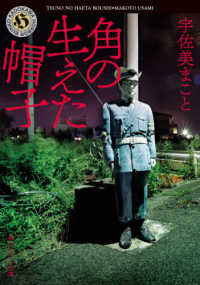- ホーム
- > 洋書
- > 英文書
- > Nature / Ecology
Full Description
Wild Anthropocene examines four key areas—the politics of deep time, neoliberalism's socio-ecological impacts, global population growth and inter-species entanglement—to demonstrate how literature illuminates progressive solutions to Anthropocene challenges. The book argues that technological mitigation of contemporary environmental crises must be complimented by a politics committed to multispecies justice. Central to this new politics is the project of reimagining our relationship with time as something other than its status within capitalist praxis.
The book brings together poetry and fiction written by a diverse range of writers to demonstrate how contemporary literature addresses important connections between social oppression and environmental issues. It also critiques techno-managerial visions of the future that celebrate humanity's ever-growing "control" over ecosystems by examining multiple sources of wildness (temporal, environmental and technological) that expose the problematic ideology underwriting such aspirations. Readers will be introduced to a way of understanding the Anthropocene that, while being informed by recent discoveries in earth science and evolutionary biology, also makes a strong case for humanities-based understanding of environmental politics.
This interdisciplinary text will be a useful addition to theoretical discussions on the Anthropocene for scholars, researchers and students in the environmental humanities, literary studies, ecocriticism and environmental philosophy.
Contents
Introduction: Towards a Wild Anthropocene: Imagining Multispecies Justice in Deep Time 1. Robinson Jeffers, Deep Time and the Geological Sublime 2. Angular Unconformities: Environmental Justice in the Poetry of Don McKay and Dionne Brand 3. Imagining Extinction in Deep Time 4. Reproductive Rights in the Context of Deep Time 5. Viral Capitalism, Tangled Trees and the Future of Biodiversity







